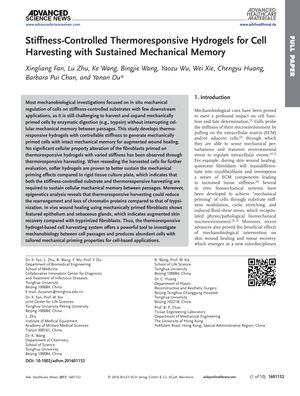Stiffness-Controlled Thermoresponsive Hydrogels for Cell Harvesting with Sustained Mechanical Memory
January 2017
in “
Advanced Healthcare Materials
”

TLDR The hydrogels help harvest cells while preserving their mechanical memory, which could improve wound healing.
The study explored the use of stiffness-controlled thermoresponsive hydrogels for cell harvesting, aiming to preserve the mechanical memory of cells, which is important for applications such as wound healing. The hydrogels enabled the harvesting of cells without significantly altering their cellular properties, and softer hydrogels were particularly effective in maintaining the mechanical priming effects. The research showed that cells harvested from these hydrogels retained their mechanical memory better than those harvested using traditional enzymatic methods like trypsinization. This was evidenced by the maintenance of gene expression levels, global DNA methylation, and histone modification expression. In vivo experiments using mechanically primed fibroblasts for wound healing demonstrated improved skin recovery with these cells compared to those harvested by trypsinization. The study concluded that the thermoresponsive hydrogel-based cell harvesting system is superior for preserving cellular mechanical memory and epigenetic status, which has potential benefits for mechanobiology research and therapeutic applications. The number of hydrogels and controls used in the experiments was 9, with statistical significance levels of p < 0.05, p < 0.01, and p < 0.001.


